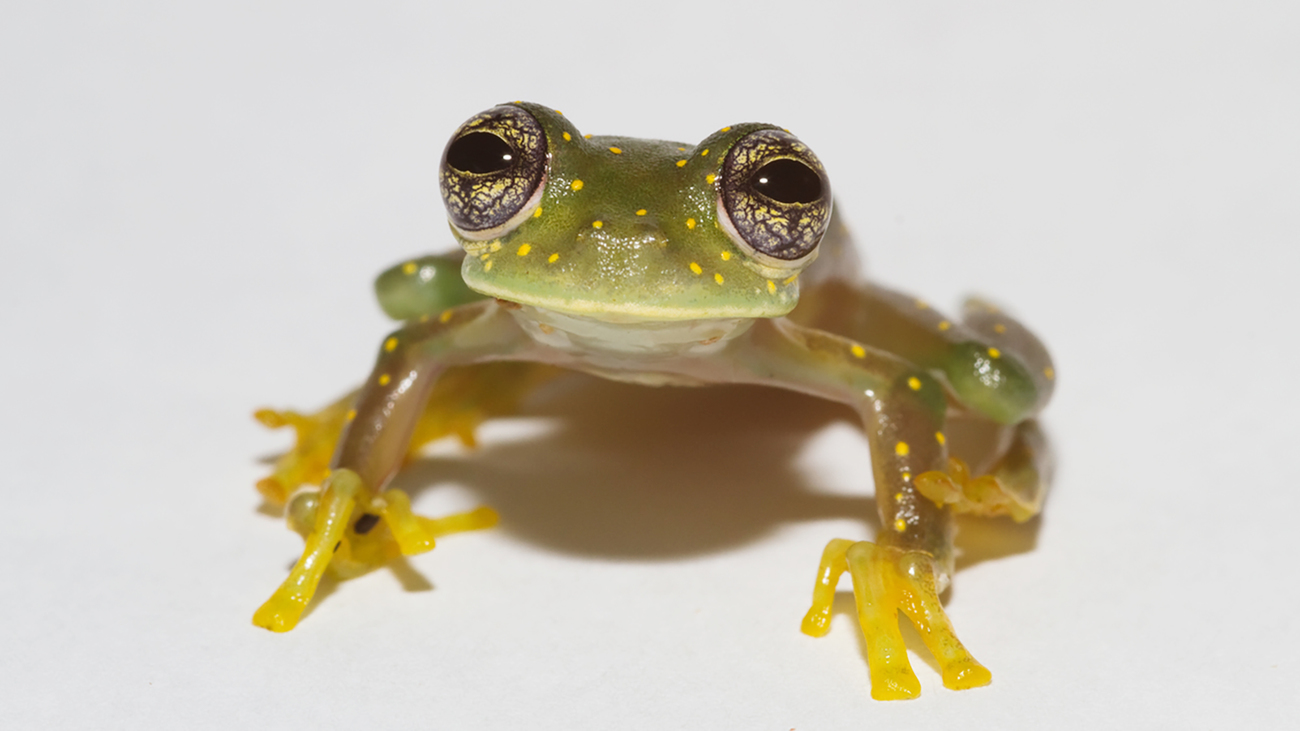Blog
These animals have some of the biggest eyes in the world
Read moreglobal decision for glass frogs ensures protection

(Panama City, Panama – 22, November 2022) — In a decisive action to curb the rapidly growing global exotic pet trade, international leaders today agreed to increased protections for glass frogs (Centrolenidae spp.) at the 19th Conference of the Parties (CoP19) of the Convention on International Trade in Endangered Species of Wild Fauna and Flora (CITES). IFAW (International Fund for Animal Welfare) has welcomed the decision, as glass frogs represent many of the challenges involved with the escalating trade in wildlife.
Currently, approximately 50% of all glass frog species evaluated by the IUCN Red List are threatened with extinction, with 10 species listed as Critically Endangered, 28 as Endangered, and 21 as Vulnerable .
“Already under immense ecological pressure resulting from habitat loss, climate change and disease, the unmanaged and growing trade in glass frogs is exacerbating the already existing threats to the species, said Danielle Kessler, U.S. Country Director. “This trade must be regulated and limited to sustainable levels to avoid compounding the multiple threats they already face.”
The proposal to list all glass frog species in CITES Appendix II was put forward by the countries of Argentina, Brazil, Costa Rica, Côte d'Ivoire, Dominican Republic, Ecuador, El Salvador, Gabon, Guinea, Niger, Panama, Peru, Togo and United States.
Regularly found hidden in shipments of animals exported from Central America to Europe, glass frogs are becoming more popular in the international pet trade. According to United States Fish and Wildlife Service (USFWS) Law Enforcement Management Information System (LEMIS) trade data and an analysis of online advertisements, over nine species of glass frogs are currently found in international trade. Due to the difficulty of differentiating between species and/or labeling simply at the genus level or as “non-CITES amphibian,” the true number is likely higher.
A comparison of U.S. import records shows that between 2016 and 2021, imports of glass frogs increased by approximately 44,000%. While several glass frog species are currently assessed as Data Deficient, they are notoriously difficult to study in the wild. Hence, it is likely that many of these species are also threatened.
"This species represents many of the challenges involved with the escalating trade in wildlife—particularly for pets—from the difficulties associated with species identification to the vastness of the species potentially at risk from trade,” added Kessler. “Protections are needed at all levels to ensure that all parties play an active role in ensuring the protection of the world’s species.”
As visually differentiating between species of glass frogs is nearly impossible, the listing was put forward at a family level. This not only simplifies implementation for governments with fewer resources but also prevents a shift in trade from listed to unlisted species (as has been seen, for example, with hammerhead shark species, which was thankfully addressed at this CoP by agreement to list the remaining Sphyrnidae species under CITES (proposal 38)).
This CITES Appendix II listing allows for an increase in data collection on the trade in glass frog species. This is critical towards providing better insight into the demand and global trade networks that exist but remain largely unstudied.
The proposal was adopted by consensus.
ENDS
IFAW experts on site and available upon request—in person or via phone/Zoom—including in English, Spanish, French, Arabic, Chinese, Dutch and Italian languages.
Visual editors: High resolution professional images available on request.
Press Contacts:
Dominica Mack, Communications Manager, Australia
WhatsApp: +61 460 432 901 e: dmack@ifaw.org
Rodger Correa, Director of Communications, Americas
WhatsApp: +1 202 834 6637 e: rcorrea@ifaw.org
Every problem has a solution, every solution needs support.
The problems we face are urgent, complicated, and resistant to change. Real solutions demand creativity, hard work and involvement from people like you.
Unfortunately, the browser you use is outdated and does not allow you to display the site correctly. Please install any of the modern browsers, for example:
Google Chrome Firefox Safari